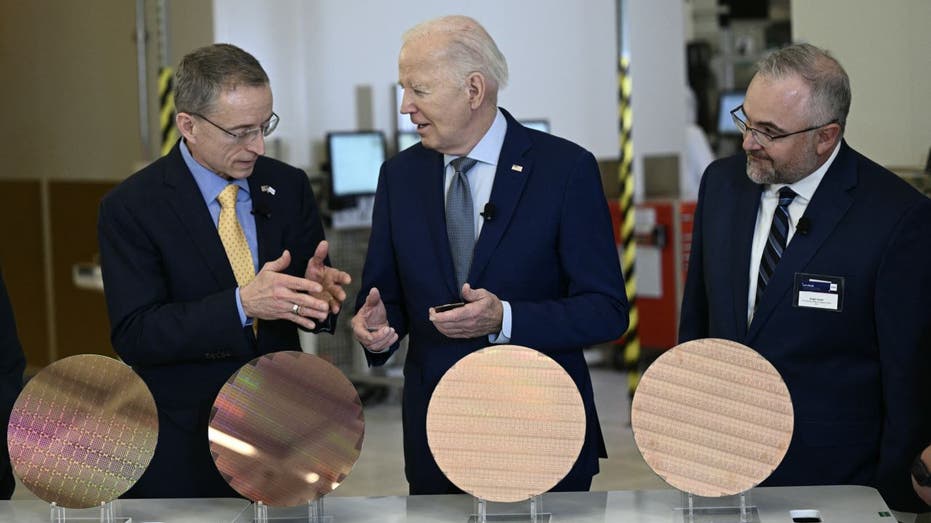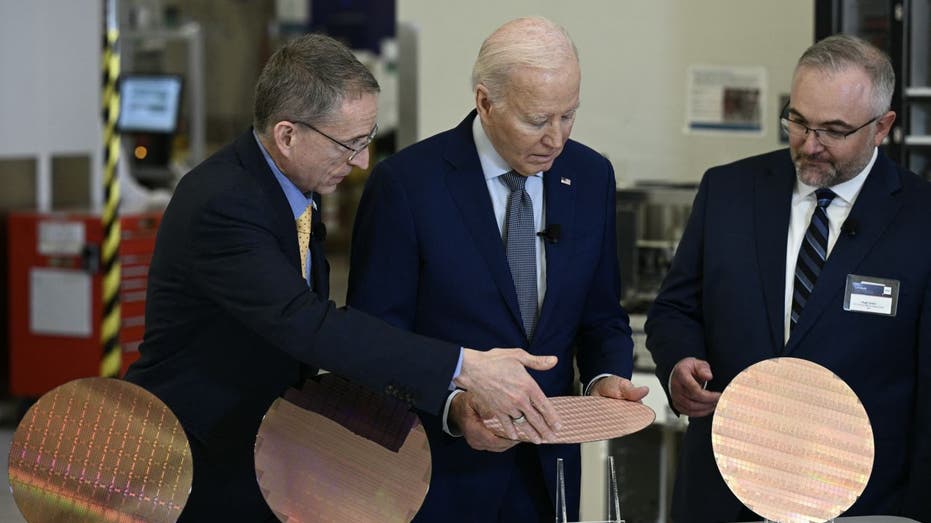Intel plans US building spree thanks to billions in federal chip subsidies
Intel investing in US chip manufacturing after receiving $20 billion in federal subsidies
Intel CEO: By 2030, the world’s most advanced chips and AI capabilities will be in the US
Pat Gelsinger discusses the billions in U.S. grants the company received to enhance domestic manufacturing on 'The Claman Countdown.'
Semiconductor giant Intel on Wednesday announced that it will receive about $20 billion in federal subsidies under the CHIPS and Science Act to advance semiconductor manufacturing projects in four U.S. states.
The Commerce Department has proposed up to $8.5 billion in direct funding for semiconductor projects in Arizona, New Mexico, Ohio and Oregon. The Treasury Department also awarded up to $11 billion in federal loans and provided Intel with an investment tax credit (ITC) of up to 25% on up to $100 billion in qualified investments.
The funding will support Intel's previously announced plans to invest over $100 billion in the U.S. over five years to expand domestic chipmaking capacity and other capabilities that are critical to economic and national security. Those facilities will also play a role in Intel's efforts to produce cutting-edge artificial intelligence (AI) chips.
"Today is a defining moment for the U.S. and Intel as we work to power the next great chapter of semiconductor innovation," Intel CEO Pat Gelsinger said in a press release. "AI is supercharging the digital revolution and everything digital needs semiconductors. CHIPS Act support will help ensure that Intel and the U.S. stay at the forefront of the AI era as we build a resilient and sustainable semiconductor supply chain to power our nation's future."
INTEL EMBARKING ON 'JOURNEY TO REBUILD' US CHIP DOMINATION, CEO SAYS

Intel is investing in U.S. chip manufacturing after receiving $20 billion in federal subsidies as part of a $100 billion spending plan. (Brendan Smialowski / AFP / Getty Images)
The funding will help Intel build two new factories and modernize an existing facility in Arizona, as well as a leading-edge chip manufacturing project in Ohio that has experienced delays. It will also fund a nearly complete advanced packing facility in New Mexico and allow Intel to expand its research and development facility in Oregon.
| Ticker | Security | Last | Change | Change % |
|---|---|---|---|---|
| INTC | INTEL CORP. | 50.59 | +2.35 | +4.87% |
Gelsinger said in an interview on FOX Business Network's "The Claman Countdown" that the chips made in Arizona and Ohio will be "the most advanced chips in the world, as people measure these, these will be below 2 nanometer chips," which are advanced beyond those made by Taiwan and other semiconductor sector leaders.
INTEL CEO TOUTS AI EVERYWHERE INITIATIVE AHEAD OF EVENT

President Biden, center, stands next to Intel CEO Pat Gelsinger, left, as they look at wafers of chips while touring the Intel Ocotillo campus in Chandler, Arizona, on Wednesday. (Brendan Smialowski / AFP / Getty Images)
"We see that across many different areas, our PCs that will provide networking components, cellphones. But the AI chips have been like the supercharger to the industry right now, and we expect that we'll be building many of those AI chips, not just Intel's chips, but for industry participants as well," Gelsinger said.
"For that, they need the most advanced technology to build the most advanced AI, and that's exactly what we're going to do at these facilities and across the nation."
Commerce Secretary Gina Raimondo said that it is one of the largest investments ever in U.S. semiconductor manufacturing, and noted that the Biden administration hopes to increase America's share of advanced chip production from 0% to 20% by 2030 through the CHIPS Act.
SECRETARY OF COMMERCE GINA RAIMONDO SAYS US BUSINESSES COMPLAINING CHINA IS BECOMING 'UNINVESTABLE'

An American flag is displayed at the Intel Ocotillo campus in Chandler, Arizona, on Wednesday. (Cassidy Araiza / Bloomberg / Getty Images)
The CHIPS and Science Act was approved on a bipartisan basis in 2022 to provide subsidies to boost domestic chip production that would diversify the semiconductor supply chain due to its centralization in Taiwan and China, given the risk of conflict between those two countries.
Though it has never governed Taiwan, the Chinese Communist Party regards it as a rogue province and has reserved the right to "reunify" it with mainland China through the use of military force.
The Biden administration recently awarded $1.5 billion to GlobalFoundries to build a semiconductor production facility in Malta, New York, and to expand existing operations there and in Burlington, Vermont.
GET FOX BUSINESS ON THE GO BY CLICKING HERE
It is also expected to announce awards for South Korea's Samsung and Taiwan's TSMC in the coming weeks out of the pool of $28 billion in subsidies and $75 billion in lending authority provided through the CHIPS Act.
Reuters contributed to this report.




















